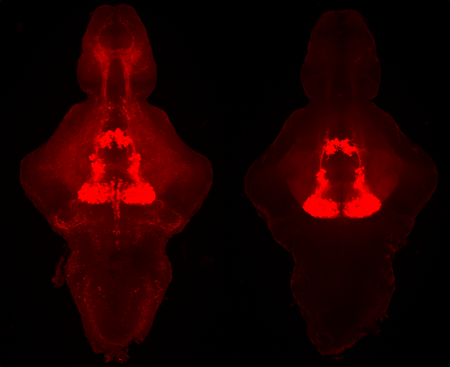Need Assistance? Call us today! 602-478-9713
California Institute of Technology (Caltech), Pasadena, CA

Two zebrafish brains, side by side, with serotonin molecules shown in red. The brain on the right comes from a fish that could not synthesize serotonin in its raphe nuclei, leading to less of the neurochemical throughout the brain. This animal slept about half as much as a normal zebrafish (brain on the left). Source Caltech
PASADENA, CA – Researchers at the California Institute of Technology (Caltech), Pasadena, Calif, have found that serotonin is necessary for sleep in two key animal models. An article on the Caltech web site details work by David Prober and Viviana Gradinaru (published in the Journal Neuron) that clears up some previous debate about the role of serotonin in sleep; Specifically, does serotonin promote sleep or wakefulness?
“To settle this debate, the Caltech team focused on a region called the raphe nuclei, which has the brain's main population of serotonin-producing (or serotonergic) neurons,” writes Lori Dajose at Caltech.edu. “The raphe are evolutionarily ancient structures found in the brain stem of a wide range of organisms from fish to humans, and they are responsible for both manufacturing and sending out serotonin to other brain regions.”
Led by senior postdoctoral scholar Grigorios Oikonomou of the Prober lab, the research began using zebrafish, “tiny transparent fish that are widely used as a model to study sleep. Like humans, zebrafish larvae are diurnal—meaning that their sleep occurs mostly at night.” Oikonomou says that research suggests that “serotonin produced by the raphe is required for the fish to get normal amounts of sleep.”
Dajose points out: “While the studies were in animal models, the raphe region and its production of serotonin are similar in human brains. The research can contribute to explanations of some sleep-related side effects of common antidepressant drugs that increase serotonin levels in the brain.”
The paper is titled "The Serotonergic Raphe Promote Sleep in Zebrafish and Mice."
Source: Caltech